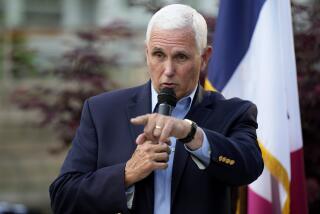Britain Says It Also Searched Files on Clinton
- Share via
WASHINGTON — About the same time State Department officials were searching through Bill Clinton’s passport files, the British government was conducting its own comprehensive search through confidential files in London for material on the Democratic presidential candidate, a British government spokesman said Friday.
Officials at the British Home Office searched through immigration and naturalization files in early October to determine if Clinton, while he was a student at Oxford University, had sought or inquired about obtaining British citizenship to avoid the draft during the Vietnam War, said Graham Blakeway, head of the news division of the Home Office.
The Home Office search occurred while the Clinton campaign was receiving reports that members of Parliament from Britain’s ruling Conservative Party had been approached by Republican Party operatives about reviewing British files to find damaging material on Clinton, former Clinton campaign official Betsey Wright said Friday.
But Wright said that her reports were second- and third-hand and until Friday she had no idea that such a search ever took place.
“A search was made; it was comprehensive,” Blakeway said in a telephone interview Friday, adding that no material on Clinton was found.
Blakeway repeatedly called the search “routine” and “straightforward,” saying it was done in response to numerous press inquiries. But Blakeway also acknowledged that Home Office policy strictly forbids discussion of any individual citizenship cases, and that no information could have been released to the press without Clinton’s permission.
Britain has no equivalent of the American Freedom of Information Act, and British government agencies usually are extremely reluctant to release information that is not already on the public record. Nevertheless, Blakeway said, the Home Office decided to conduct the search out of “sheer helpfulness” to the inquiring journalists.
Once the search was completed, he said, the press office gave off-the-record press “guidance” to journalists that if they wrote that Clinton had ever applied for British citizenship “it would be wrong.” The guidance was intended to prevent a strict “no comment” response from being misinterpreted, he said.
The British government action adds a possible new wrinkle to the controversy over the actions by senior State Department political appointees in directing an exhaustive pre-election search through Clinton’s passport files in an effort to find damaging material on the Democratic presidential nominee in the closing weeks of the campaign.
State Department officials initially defended the search on the grounds that it was conducted in response to Freedom of Information requests from news organizations, but later acknowledged that the requests were improperly expedited and that the department’s responses were politically motivated and unprecedented in scope.
A report by State Department inspector general Sherman M. Funk late last month confirmed that former assistant secretary of state for consular affairs Elizabeth M. Tamposi--who was fired over the Clinton passport search--also called the U.S. Embassy in London and directed that consular files there be searched for information relating to Clinton dating from 1968 to 1970, while he was at Oxford.
Asked Friday about the Home Office search, British Ambassador to Washington Robin Renwick said, “The British Embassy has not been involved in any way in anything to do with questions about” Clinton’s passport. “We have not been aware of any action taken in London about this,” he said.
Charles Black, a senior Bush-Quayle campaign adviser who was directing late campaign efforts to find negative information about Clinton, said Friday that he also was unaware of the Home Office search, adding that he was confident that campaign officials made no approaches about finding such material to either the U.S. or British governments.
But Black and other Bush-Quayle campaign officials confirmed that the campaign was highly interested in finding damaging material on Clinton’s years at Oxford and even hired a Republican Party “opposition research” specialist to dig for information.
The researcher, Gary Maloney, was a one-time protege of the late Republican Party chairman Lee Atwater. Maloney in 1990 was fired as director of strategy and research at the National Republican Congressional Committee after he was accused of conducting a covert investigation of a GOP gubernatorial candidate in Texas, including misrepresenting himself and trying to solicit comments about the candidate’s drinking habits.
More to Read
Sign up for Essential California
The most important California stories and recommendations in your inbox every morning.
You may occasionally receive promotional content from the Los Angeles Times.










